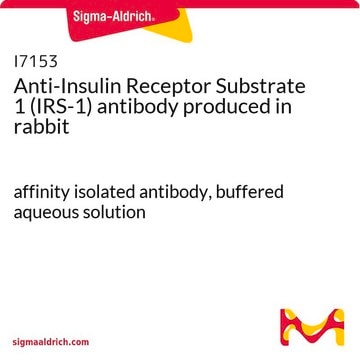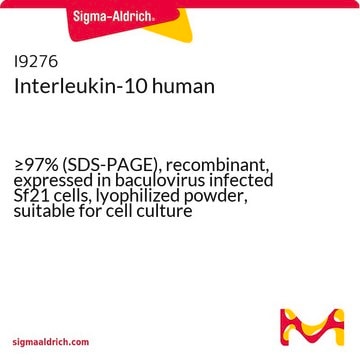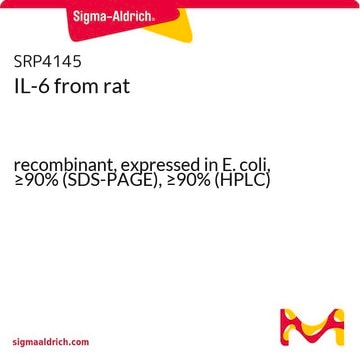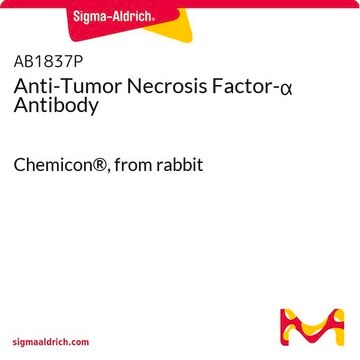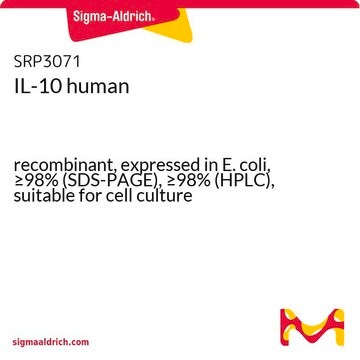I9154
Interleukin-10 from rat
>95% (SDS-PAGE), recombinant, expressed in E. coli, lyophilized powder
Synonym(s):
IL-10
Sign Into View Organizational & Contract Pricing
All Photos(1)
About This Item
Recommended Products
biological source
rat
Quality Level
recombinant
expressed in E. coli
Assay
>95% (SDS-PAGE)
form
lyophilized powder
potency
1-35 ng/mL ED50
mol wt
predicted mol wt ~19 kDa
packaging
pkg of 5 μg
impurities
endotoxin, tested
UniProt accession no.
storage temp.
−20°C
Gene Information
rat ... Il10(25325)
Application
Interleukin-10 (IL-10) from rat has been used to study the anti-allodynic effect of IL-10 in rat model.
Biochem/physiol Actions
Interleukin-10 is an important regulator of the functions of lymphoid and myeloid cells. IL-10 can block the activation of cytokine synthesis and several accessory functions of macrophages. Human and mouse IL-10 share a 73% sequence homology. However, human IL-10 acts on both human and mouse target cells, while mouse IL-10 has species-specific activity. In mouse, the cellular sources of IL-10 consist of Th2 cells, activated fetal thymocytes, macrophages, keratinocytes, LY-1+ (CD5+), and normal B cells. In human, the cellular sources of IL-10 consist of CD4+ T cells and T cell clones, thymocytes, B cells, B cell lymphomas, macrophages, mast cell lines and keratinocytes. IL-10 stimulates the growth of stem cells, mast cells and thymocytes. IL-10 enhances cytotoxic T cell development, and co-stimulates B cell differentiation and Ig secretion. IL-10 regulates angiogenesis by inducing the cell-type dependent expression of either angiogenic or angiostatic factors.
Interleukin-10 regulates lymphoid and myeloid cell functions. It blocks the activation of cytokine synthesis and several accessory functions of macrophages. IL-10 enhances cytotoxic T cell development and co-stimulates B cell differentiation and Ig secretion. IL-10 regulates angiogenesis by inducing cell-type dependent expression of either angiogenic or angiostatic factors.
Physical form
Lyophilized from a 0.2 μm filtered in 20 mM Tris, 0.1 M sodium chloride containing 50 μg of bovine serum albumin per 1 μg of cytokine.
Analysis Note
The biological activity is measured in a cell proliferation assay using the murine mast cell line, MC/9.
Storage Class Code
11 - Combustible Solids
WGK
WGK 3
Certificates of Analysis (COA)
Search for Certificates of Analysis (COA) by entering the products Lot/Batch Number. Lot and Batch Numbers can be found on a product’s label following the words ‘Lot’ or ‘Batch’.
Already Own This Product?
Find documentation for the products that you have recently purchased in the Document Library.
Justine Durand et al.
Journal of immunology (Baltimore, Md. : 1950), 195(10), 5035-5044 (2015-10-04)
Emerging knowledge regarding B cells in organ transplantation has demonstrated that these cells can no longer be taken as mere generators of deleterious Abs but can also act as beneficial players. We previously demonstrated in a rat model of cardiac
Byung-Sang Lee et al.
Journal of Korean medical science, 28(2), 308-314 (2013-02-13)
We examined the possible anti-inflammatory mechanisms of gabapentin in the attenuation of neuropathic pain and the interaction between the anti-allodynic effects of gabapentin and interleukin-10 (IL-10) expression in a rat model of neuropathic pain. The anti-allodynic effect of intrathecal gabapentin
Yoshiyuki Goto et al.
Scientific reports, 5, 15918-15918 (2015-11-03)
Fucosylated glycans on the surface of epithelial cells (ECs) regulate intestinal homeostasis by serving as attachment receptors and a nutrient source for some species of bacteria. We show here that epithelial fucosylation in the ileum is negatively regulated by IL-10-producing
Mohamad Bouhamdan et al.
Cellular signalling, 27(10), 2068-2076 (2015-07-26)
The mitogen activated protein kinases ERK1/2 play an important role in response to toll like receptor (TLR) activation and cytokine production, including IL-10 and IL-12. Here, we examined the role of MEK1 in ERK1/2 activation in response to TLR4 agonist
Martina Severa et al.
Journal of interferon & cytokine research : the official journal of the International Society for Interferon and Cytokine Research, 35(9), 668-681 (2015-04-30)
Plasmacytoid dendritic cells (pDCs) display altered immune-phenotype in multiple sclerosis (MS) patients and are found actively recruited in postmortem MS brain lesions, implying that their immune regulation may represent an important aspect of MS pathogenesis. Because of the reported Toll-like
Our team of scientists has experience in all areas of research including Life Science, Material Science, Chemical Synthesis, Chromatography, Analytical and many others.
Contact Technical Service